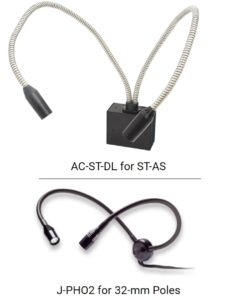LIGHTINGS
To get the best image quality, a good illumination of the sample is a must.
Results can reach perfection with the appropriate settings and lighting techniques.
Dome Lighting
Metal and other reflective samples can be especially difficult to image, as wherever the light source is will be reflected on the sample.
With this accessory however, the lighting is coming from 360 degrees around the sample, giving even lighting across the sample.
This is especially useful for challenging samples like metal ball bearings.
without dome
with dome
UV Lighting
Ultraviolet lighting is below 380nm outside the visible light spectrum and can be used to increase the image resolution beyond the limit of standard optical microscopes.
This can be used to better see cracks in solder or security features on authentication documents and blils.
UV light also increases the contrast of certain samples relative to their surroundings, due to the interaction of light with the molecules within the sample itself. One example is protein crystals.
banknote with visible light
banknote with UV light
Raking Light
Raking light is an efficient and easy way to illuminate your sample area using a set of two flexible arms with LED lighting.
You can adjust the intensity and which arm you want to use to adapt your lighting as much as possible.
We provide two main types of external lighting: one for the Hirox regular stand and one for custom stand with 32-mm poles.
In addition to a long lifetime, they are light and easily mountable/dismountable.

Transmitted Polarized Lighting
Using a filter with the condenser, light can be restricted to a single direction of vibration.
This filter can enhance an image by reducing light intensity and glare.
This is especially useful with transparent biological samples, as different elements/features of the sample can be observed by changing the direction of the light.





